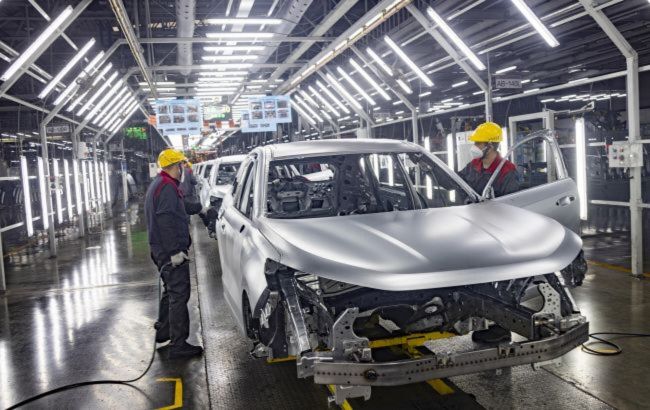Trump's tariffs cause US to prepare for shock in automotive market
 Illustrative photo: American automakers prepare for the impact of Trump's tariffs (Getty Images)
Illustrative photo: American automakers prepare for the impact of Trump's tariffs (Getty Images)
Trump's tariffs on car imports and auto parts will increase industry costs and significantly reduce sales volumes, according to NBC News.
According to Wall Street reports and industry experts, car sales are expected to drop by millions of units, while prices for both new and used cars will rise. Additionally, car manufacturers' expenses could increase by over $100 billion.
“What we’re seeing now is a structural shift, driven by policy, that’s likely to be long-lasting,” Felix Stellmaszek, Boston Consulting Group’s global lead of automotive and mobility, told CNBC. “This may well be the most consequential year for the auto industry in history — not just because of immediate cost pressures, but because it’s forcing fundamental change in how and where the industry builds.”
According to BCG's forecast, tariffs will annually increase industry costs by between $110 billion and $160 billion. This could affect 20% of the revenue in the US new car market, raising production costs for both American and foreign car manufacturers.
The Michigan-based Center for Automotive Research estimates that US car manufacturers' costs will rise by $107.7 billion. Of that amount, $41.9 billion will be for Detroit-based companies, including General Motors, Ford Motor, and Stellantis (the parent company of Chrysler).
Both reports consider the 25% tariff on car imports imposed by President Trump on April 3 and similar tariffs on auto parts, which will take effect by May 3.
Analysts believe that while manufacturers and suppliers will cover some of the cost increase themselves, the rest will be passed on to American consumers, potentially leading to reduced sales volumes.
“We believe the tariffs as proposed will raise the cost of both importing and manufacturing vehicles in the US by at least a low to mid single digit thousand dollar level on average, and we believe it will be hard for the auto industry to fully pass this on, especially with softening consumer demand more generally,” Goldman Sachs analyst Mark Delaney said in a Thursday investor note.
The company predicts that the average prices of new cars in the US will rise by about $2,000–$4,000 over the next 6–12 months due to the new tariff-related expenses.
Manufacturer reactions
Car manufacturers are responding to the tariffs in different ways. Companies with primarily domestic production, like Ford and Stellantis, have announced temporary discounts for employees, while British manufacturer Jaguar Land Rover has halted shipments to the US Hyundai Motor has stated it will not raise prices for at least the next two months to alleviate consumer concerns.
Consumer sentiment in April was even worse than expected - according to a Michigan University survey, the expected inflation rate reached its highest point since 1981.
According to Sam Abuelsamid, vice president of analytics at the Telemetry Auto Institute, many car manufacturers have at least a two-month supply of cars that are not subject to the new tariffs. This will allow them to sell these vehicles for the next two months without increasing prices.
According to Telemetry's forecast, new production costs, parts, and other components will lead to a reduction in sales by over 2 million units annually in the U.S. and Canada, triggering a "domino effect" for the economy.
“A couple million-unit reduction in sales will have a broad impact economically,” Abuelsamid said. “That’s driven by higher prices, not just for vehicles, but across the board … which is going to limit people’s spending power.”
Price of new and used cars
The affordability of new and used cars has been a persistent issue in recent years. According to Cox Automotive, the average price of a new car is nearly $50,000. This does not include financing costs, which have significantly increased in recent years due to anti-crisis measures.
According to Cox Automotive, auto loan rates remain at their highest level in a decade - over 9.64% for new cars and nearly 15% for used ones.
“We expect to see declining discounting and then accelerated price increases as the tariffs are passed through and supply tightens, leading to price increases on all types of most new vehicles,” Cox Automotive Chief Economist Jonathan Smoke said during a virtual event Monday. “Over the longer term, we expect production and sales to fall, newly used prices to increase, and some models to be eliminated.”
According to Cox Automotive's estimates, the projected price increases will depend on the type of car:
-
$6,000 – Increase in the price of imported cars due to the 25% tariff on cars assembled outside the U.S.
-
$3,600 – increase in the cost of US-assembled cars due to a similar 25% tariff on auto parts.
-
$300–$500 – additional increase due to previously imposed tariffs on steel and aluminum.
Trump's tariff initiatives
In early April, US President Donald Trump imposed new tariffs on imports from over 180 countries. Depending on the country and product categories, the rates range from 10% to 54%.
Specifically, the US imposed a 25% tariff on car imports from European countries.
In response, British manufacturer Jaguar Land Rover halted its car shipments to the US, while German automaker Volkswagen stopped exporting cars to the US that are assembled in Mexico.


